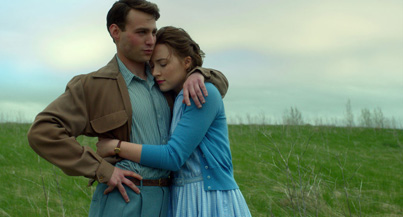If I Were an Academy Member: Ben Gruchow
By Ben Gruchow
February 27, 2016
8) Room
Room has a thrilling first half stapled to a sedate and rather maudlin second half, before almost, but not quite, totally redeeming itself with a powerful final scene. The effect of the two halves is inverse to the source novel, where most of the development and poignancy arrived courtesy of events less immediate and urgent than those in the first half. I'm dancing around the rather crucial event that separates the two parts of the film; it's a limited release that only recently got its home-media offering, and there are plenty of potential viewers to not spoil. The movie takes place in Room, a 10-foot-by-10-foot square containing a rudimentary bathroom, kitchen, and living quarters, and it's told from the point of view of five-year-old Jack, who lives there with his Ma. They live in Room, and never leave it, for reasons that go undisclosed for a while. In the film, this is terrifyingly claustrophobic, and a marvelous achievement in production design and cinematography. It is matched by the raw immediacy of Brie Larson's performance as Ma, and it is these two factors - Larson's work, and the environment of Room - that buoy the film into a worthy standing on this list, if only on the tail end of it.
7) The Martian
Getting the big reason for the movie's next-to-last place standing out of the way at the forefront: there is nothing that Ridley Scott's The Martian does as cinema that Andy Weir's The Martian does not do better as a novel, and the last-act timeline compression that one suspects was done out of sheer necessity for pacing reasons-the movie is already 140-odd minutes-does some destructive things to the final set piece and to the character work that's been built up so far. I read the book prior to seeing the film; I cannot un-read the book, and so the best I can do is attempt to put myself in the shoes of a newcomer to this story who chooses to see the movie first. In those shoes, I can recognize Scott's film as a skillful and intelligent procedural, while imagining that movie-only viewers might benefit from investigating the source material. The bright spots in this adaptation belong to Matt Damon as the astronaut Mark Watney, Chiwetel Ejiofor as NASA mission director Vincent Kapoor, and Kristen Wiig as NASA media-relations director Annie Montrose. These three create fully-realized personas out of varying degrees of screen time, and they're at least partially responsible for the success of a movie that celebrates challenge, invention, and perseverance in an optimistic way.
6) The Big Short
The best word I can think of to sum up this film is contemptuous. The Big Short is choppy and rough around the edges when it comes to its formal qualities - at times, it seems like it doesn't know whether to present itself as a full-on narrative or a faux-documentary piece - but it uses this shagginess to transport a potent examination of how amiably, even idealistically, the major players behind the housing bubble architected the downfall of homeowners and (to a degree) their own careers. The movie achieves the challenge of presenting these individuals as gullible and greedy without being anything less than or more than human in their strengths and weaknesses; it's a vicious apocalypse comedy that somehow also denies the audience the schadenfreude that we'd expect to feel.
It is above all else an angry film, about the fates of its nominal protagonists and antagonists; intelligent and instantly dismissive of anyone who can't keep up at the speed-rap pace of the film's characters. It's also true that nothing that happens here is particularly great; the emotions evoked and the conclusions drawn are nothing we don't already know, and director Adam McKay is noticeably rough with modulating the dramatic tendencies of his characters. Still, it's alive and spiky and irritable in a way that's pleasantly surprising for such a slick and trailer-ready studio vehicle.
Continued:
1
2
3
|
|
|
|




